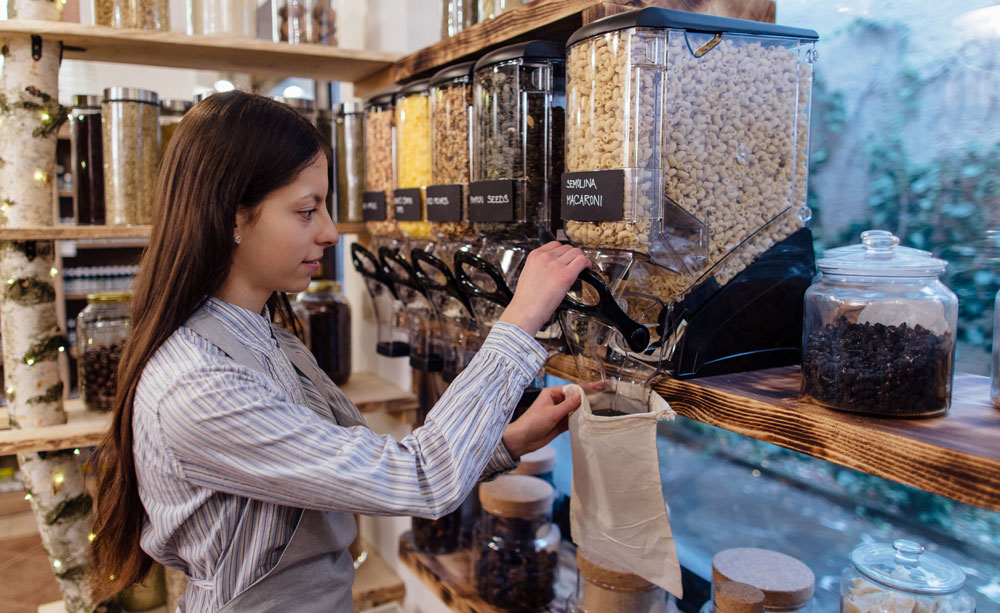When you see a product labeled “eco-friendly,” or “environmentally sustainable,” it can be tempting to take this at face-value and feel good about your purchase. However, a new report shows that while many major companies are making claims that they are tackling the plastic pollution crisis, there are reasons to be skeptical.
The report, “Throwing Away the Future: How Companies Still Have It Wrong on Plastic Pollution ‘Solutions’,” from Greenpeace USA, warns consumers that many solutions announced by companies to tackle the plastic pollution crisis — such as switching to paper or ‘bioplastics,’ or embracing chemical recycling — are not only failing to move us away from single-use packaging, but are diverting attention away from efforts to refill and reuse.
“Despite increasing scientific understanding of the irreversible damage plastic can cause to our environment and communities, plastic production is projected to increase dramatically in the coming years,” says Ivy Schlegel, Greenpeace USA senior research specialist, who authored the report. “Corporations are scrambling to look greener by promoting what they are calling ‘sustainable alternatives.’ But these so-called solutions are actually false promises that put unacceptable pressures on natural resources. To solve the plastic pollution crisis, companies need to rethink how products are delivered to consumers and invest instead in reusable and refillable delivery systems.”
While many companies have signaled their intent to make packaging more recyclable, reusable, compostable or from recycled content, the latest figures show they are aiming to continue, and even increase disposable packaging. By the end of 2019, global plastic production and burning is projected to emit the carbon equivalent of 189 coal-fired power plants, according to the Center for International Environmental Law. And it is estimated that by 2050, there will be 12 billion metric tons of plastic waste in natural environments.
While the biggest change will need to come at the corporate level, the experts at Greenpeace say that individuals can get involved in the following ways:
- Be wary of vague marketing terms and sustainability language. Just because a label claims to be good for the environment, doesn’t make it true.
- Whenever possible, buy items using reusable and refillable containers.
- Demand that corporations take action to end the plastic pollution crisis. One easy way to do that is by signing Greenpeace’s international petition at Greenpeace.org.
As more companies claim to go green, you can take action by thinking critically about claims made on product labels, and by looking for solutions that eliminate single-use packaging and plastic.
Courtesty: StatePoint














 Deering Estate
Deering Estate
 Massage Envy South Miami
Massage Envy South Miami
 Calla Blow Dry
Calla Blow Dry
 My Derma Clinic
My Derma Clinic
 Sushi Maki
Sushi Maki
 Sports Grill
Sports Grill
 The Healthy Kitchen
The Healthy Kitchen
 Golden Rule Seafood
Golden Rule Seafood
 Malanga Cuban Café
Malanga Cuban Café

 Kathleen Ballard
Kathleen Ballard
 Panter, Panter & Sampedro
Panter, Panter & Sampedro
 Vintage Liquors
Vintage Liquors
 The Dog from Ipanema
The Dog from Ipanema
 Rubinstein Family Chiropractic
Rubinstein Family Chiropractic
 Your Pet’s Best
Your Pet’s Best
 Indigo Republic
Indigo Republic




 ATR Luxury Homes
ATR Luxury Homes


 2112 Design Studio
2112 Design Studio
 Hamilton Fox & Company
Hamilton Fox & Company
 Creative Design Services
Creative Design Services
 Best Pest Professionals
Best Pest Professionals
 HD Tree Services
HD Tree Services
 Trinity Air Conditioning Company
Trinity Air Conditioning Company
 Cisca Construction & Development
Cisca Construction & Development
 Mosquito Joe
Mosquito Joe
 Cutler Bay Solar Solutions
Cutler Bay Solar Solutions


 Miami Royal Ballet & Dance
Miami Royal Ballet & Dance
 Christopher Columbus
Christopher Columbus
 Pineview Preschools
Pineview Preschools
 Westminster
Westminster
 Carrollton
Carrollton
 Lil’ Jungle
Lil’ Jungle
 Frost Science Museum
Frost Science Museum
 Palmer Trinity School
Palmer Trinity School
 South Florida Music
South Florida Music
 Pinecrest Orthodontics
Pinecrest Orthodontics
 Dr. Bob Pediatric Dentist
Dr. Bob Pediatric Dentist
 d.pediatrics
d.pediatrics
 South Miami Women’s Health
South Miami Women’s Health

 The Spot Barbershop
The Spot Barbershop
 My Derma Clinic
My Derma Clinic




 Miami Dance Project
Miami Dance Project

 Rubinstein Family Chiropractic
Rubinstein Family Chiropractic
 Indigo Republic
Indigo Republic

 Safes Universe
Safes Universe
 Vintage Liquors
Vintage Liquors
 Evenings Delight
Evenings Delight





 Atchana’s Homegrown Thai
Atchana’s Homegrown Thai
 Baptist Health South Florida
Baptist Health South Florida

 Laser Eye Center of Miami
Laser Eye Center of Miami
 Visiting Angels
Visiting Angels
 OpusCare of South Florida
OpusCare of South Florida

 Your Pet’s Best
Your Pet’s Best





 HD Tree Services
HD Tree Services
 Hamilton Fox & Company
Hamilton Fox & Company


 Creative Design Services
Creative Design Services